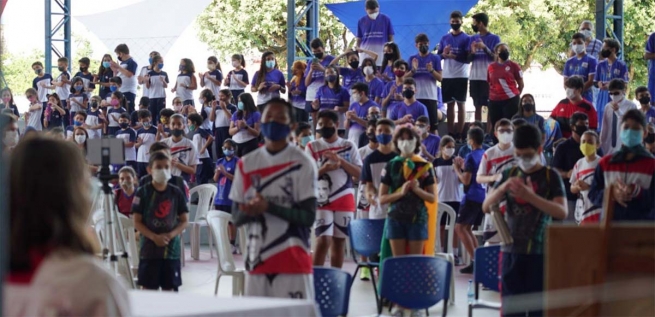BRAZIL: Don Bosco College celebrates 100 years with new kindergarten

‘Don Bosco Dreams with Us’ project provides education for Brazilian and Venezuelan children ages 6-12
(MissionNewswire) Don Bosco College in Manaus, Brazil, is celebrating its 100-year anniversary this year. Salesian missionaries first arrived in Manaus in 1921 to start a school to educate youth in the Amazon. The goal was to create a school that would rival those already providing quality education in other regions of Brazil. Salesians first set up youth centers and then offered evening classes before launching a boarding school, which would later become the current Salesian school.
Don Bosco College has modern equipment and a large library as well as computer, physics, chemistry and biology laboratories. The structure of the school is complete with a gym suitable for playing various sports, a swimming pool, indoor sports fields, an auditorium that can accommodate 600 people, a ballroom, a judo room and a space for leisure time.
In 2019, Don Bosco College started assessing the need for a local kindergarten and how it could accommodate that within the building’s current structure. The renovation was completed this year and in July, the “Don Bosco Dreams with Us” project was launched to provide education for Brazilian and Venezuelan children ages 6-12.
Don Bosco College is currently offers courses ranging from kindergarten to level I and II primary schools and high school, with opportunities for full-time education, catechesis, sports, and cultural courses that serve students and the educational community.
“This school expansion allows youth to have a place to start their early education, which lays the foundation for later learning,” said Father Gus Baek, director of Salesian Missions, the U.S. development arm of the Salesians of Don Bosco. “Don Bosco College is ensuring that youth living in the Amazon have access to the education they needs to learn the skills for later employment, enabling them to be self-sufficient and contribute to their families and community.”
Brazil has one of the strongest economies in Latin America and is an important agricultural and industrial power in the region. Just over 15 percent of Brazilians live in poverty, with the majority living in the rural northeast of the country, according to the World Bank. While Brazil is making positive changes, there are still large gaps between the poor and the rich, and issues of income inequality and social exclusion remain at the root of poverty.
Inequalities also exist in access to education and educational efficiency. These inequalities are greatest for children and youth who are poor, live in rural areas or who have an incomplete compulsory education. Salesian missionaries working with poor youth and their families in Brazil develop programs and provide youth opportunities for furthering their education and skills.
###
Sources:
ANS Photo (usage permissions and guidelines must be requested from ANS)
ANS – Brazil – Manaus celebrates centenary of “Colégio Dom Bosco”
Salesian Missions – Brazil
World Bank – Brazil





